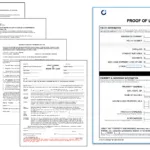Filing a homeowners or property insurance claim can be frustrating. Jumping into a claims process and dealing with insurance companies, adjusters, contractors, or attorneys immediately after your property is damaged can be a headache. Having your property damaged is already frustrating, and making an insurance claim and following it through to payment can be tedious. It’s not something you do every day, and it’s subject to nuanced and hard to understand state laws and regulations, as well as complicated policy terms. The good news, through, is that South Carolina has protections for policyholders built into the insurance law, and the insurance regulations provide strict deadlines and requirements for the investigation and payment of property insurance claims. If policyholders are aware of these deadlines and rules, and are proactive with respect to their claims, they should have a smooth, fast, efficient, and fair insurance claim process.
These resources are built to help policyholders — and all the stakeholders who work with them, like adjusters, attorneys, contractors, and consultants. These resources will help you file your claim correctly, document your losses thoroughly, and know when and how to followup through the claim process. And, if necessary, how and when to escalate and resolve the claim.
Claim Filing Deadline
Reasonable time
The deadline for informing the insurer of a claim is set by the policy itself. It is always best practice to inform an insurance company of the losses sustained and that a claim is being made as soon as it is reasonably possible to do so after the damage is incurred.
Initial Response Time
Reasonably promptly
South Carolina requires insurance companies to acknowledge property insurance claims with reasonable promptness after the policyholder provides notice of the claim.
Claim Decision Time
Reasonably promptly
South Carolina insurance law generally requires that an insurer must attempt “in good faith to effect prompt, fair, and equitable settlement of claims.” Generally, the investigation must be completed and the claim paid within 90 days of demand by the insured, absent reasonable cause for delay.
Lawsuit Deadline
3 years
South Carolina statutes specifically set the deadline to initiate a lawsuit pursuant to an insurance policy at 3 years from the date of loss.
State Department
South Carolina Department of Insurance
South Carolina Department of Insurance
1201 Main Street
Suite 1000
Columbia, SC 29201
(803) 737-6160
Email: info@doi.sc.gov
South Carolina Department of Insurance website
File your Claim Now with ClaimSpot
ClaimSpot guides you through a quick, secure, and effortless filing experience.
It’s free. Let ClaimSpot Make Your Claim Fast & Easy.
South Carolina Insurance Claim Guide
Filing: South Carolina Insurance Claim FAQs
All insurance claims start by informing your insurance company of the loss. You want to do this as soon as possible. There are many ways to notify the insurance company. It’s most important that you keep a record of notifying them. Here are frequently asked questions about how to best “file your claim” with the insurance company in South Carolina and the state regulations that will help (or hurt) you!
In order to initiate a claim under a property insurance policy in South Carolina, the policyholder must inform their insurance carrier of the loss (either directly or through their agent), and that they are making a claim. This means that the only requirement to initiate the process is that the insurance carrier is informed that there has been a loss, some details about the loss, the policy is identified, and that the policyholder wants to make a claim.
In many cases, an insurance company will call this communication a first notice of loss, or FNOL. In South Carolina, insurance laws call this communication a “notice of claim” or “notification of claim.”
Most insurance companies provide multiple ways to contact them after a loss to begin the claims process, these usually include:
a. Phone call (a number is usually provided on the insurance company’s website);
b. Online portal – many insurance companies have an online form to notify the claims department of a loss, this may even be through a mobile app;
c. Your agent – many insurance companies even have a different section of their website or phone number for an agent to inform them of a policy-holder’s loss;
d. Online software as a virtual assistant.
While it is easy and quick to start a claim, claimants need to continue to follow-up and provide more information. In many cases, the insurer will require more information and supporting documentation, including specific forms, to actually process and adjust the claim. These specific necessary forms should be provided to the claimant by the insurance company.
1. Promptly inform your insurance carrier of the loss (see above);
2. As soon as possible begin to mitigate the damage – protect the property and secure it against further damage as soon as it is safe and possible to do so.
3. Cooperate with your insurance company and communicate with them (and keep copies of all correspondence).
4. Make your property available for inspection as soon as it is safe and possible to do so.
5. Prepare supporting documents for your claim including:
– Inventory list;
– Description of damages;
– Photographs and/or videos of the damage;
– Receipts; etc.
Reporting Deadline: South Carolina insurance law does not set forth any specific deadline for making a property insurance claim. This means that the deadline for informing the insurer of a claim is set by the policy itself. It is important to be familiar with the insurance policy so that deadlines are not missed. A policy may require the policyholder to provide “immediate written notice” of the loss to the insurance company, or may use language that the claim be made “promptly” or within a “reasonable time”.
It is always best practice to inform an insurance company of the losses sustained and that a claim is being made as soon as it is reasonably possible to do so after the damage is incurred and a determination that a claim will be filed is made. While it is never a good idea to delay in providing the insurance company with information once it has been determined that a claim will be filed, the actual meaning of “immediate” or “prompt” or “reasonable” with respect to making a claim depends on the circumstances – if a home is completely destroyed by a storm and the phones, internet, and power are off, it may take a little longer to make the claim.
Be sure to check the language of the insurance policy to determine the notification or reporting deadlines. But, in any event, remember that best practice is to provide notice of the loss and claim to the insurer as soon as possible.
Followup: Document Your South Carolina Insurance Claim FAQs
Notifying the insurance company about a loss is just the first step. The most important work comes next: documenting your loss and following up with the carrier. South Carolina has enacted many regulations to guarantee that the insurance company acts moves promptly and fairly to investigate and pay your claim…but you need to understand these regulations and know the appropriate timeframes. That means communicating with the insurance company early and often and putting them on the clock. These FAQs will let you know the applicable standards.
Documentation Deadline: South Carolina does not set a specific deadline to provide support for a claim by statute, but instead allows this timeline to be set by the policy itself. In many cases, South Carolina insurance policies require that a proof of loss document be provided within 60 days of when requested by the insurance company.
Note, however, that South Carolina specifically requires that if an insurance company requires a proof of loss after receiving notice of the claim, they must provide the proof of loss forms within 20 days from receipt of notice of loss. If the proof of loss forms are not provided within 20 days, the policyholder is deemed to have complied with any “proof of loss” requirements in the policy by providing “written proof covering the occurrence, character, and extent of the loss for which claim is made.” This means that the original notice of loss may be sufficient.
In any event, however, the deadline for submitting a proof of loss may be extended by agreement between the parties if circumstances make it difficult or impossible for the policyholder to comply with the deadline as set forth by the policy.
Note, however, that no matter the actual deadline for providing supporting documentation, it is always best practice to provide a proof of loss document and support of the claim as soon as possible (while noting that the document only presents the knowledge at the time and may be amended or updated). Getting a properly completed proof of loss to the insurance company quickly is a good way to get the claim process moving along, and to get your payment.
South Carolina has adopted laws governing unfair claims settlement practices to protect policyholders and to provide a streamlined timeline for claims to be handled, and these laws provide deadlines for the acknowledgment and processing of claims.
Deadlines for Acknowledgment: South Carolina requires insurance companies to acknowledge property insurance claims with reasonable promptness after the policyholder provides notice of the claim.
Further, as noted above, South Carolina law requires that the insurer provide the policyholder with any necessary proof of loss forms, to comply with the policy conditions within 20 days from receiving notice of the claim.
Deadlines for Investigation: South Carolina doesn’t really provide a specific breakdown of the time to begin an investigation of the claim. However, South Carolina law does require that insurance companies “adopt and implement reasonable standards for the prompt investigation and settlement of claims.”
South Carolina requires insurers to acknowledge communications with respect to claims arising under its policies by the policyholder with reasonable promptness.
Resolving: Get Paid & Protect Your Rights On South Carolina Insurance Claim FAQs
Ultimately, the insurance claim must be approved and paid (or, unfortunately, denied). Getting to this step and getting the money has a lot of logistics…and that is if everything goes well. If all or any portion of the claim is debated (which is really common) then you need to escalate it. In either event, South Carolina has regulations governing these timelines to guide the way. These FAQs show what is supposed to happen.
Deadline for Acceptance/Denial: South Carolina insurance law generally requires that an insurer must attempt “in good faith to effect prompt, fair, and equitable settlement of claims.” Note, however, that in the event that an insurance company does not complete its investigation and pay a covered claim within 90 days after demand by the policyholder (without reasonable cause), the company can be liable for attorneys’ fees if a lawsuit is initiated.
Deadline for Payment: South Carolina does not really specify the timeline by which payment must be made after the claim determination is made, other than through the guidelines and timelines set forth above in the acceptance/denial section. It is an unfair business practice for an insurance company to not attempt in good faith to “effectuate a prompt, fair, and equitable settlement of claims” once liability is “reasonably clear.” Specifically, it is generally required that South Carolina insurance companies pay within 90 days after demand by the policyholder (which could be through the proof of loss) absent reasonable evidence to dispute its responsibility for payment.
If an insurance company is determined to be in violation of the unfair claims settlement practices requirements, the insurer is subject to penalties. While the unfair trade practices requirements do not create a private right of action (the ability for a policyholder to sue the insurance company directly for breach) the policyholder can complain to the state insurance department and the insurer can be penalized.
If the insurance company unreasonably withholds payment for more than 90 days after demand is made by the policyholder, the company can be liable for attorneys’ fees in the event a lawsuit to recover is initiated.
Additionally, insurers have a requirement to act in good faith in investigating and settling the claim. A policyholder may file suit against the insurer for breach of contract if they believe the insurer has acted in bad faith. In order to establish an insurer’s bad faith, the claimant must show:
(1) That there was an insurance policy between the claimant and the insurer;
(2) The insurance company refused to pay benefits due under the policy;
(3) That the insurance company’s refusal to pay was unreasonable, a breach of an implied covenant of good faith and fair dealing, or otherwise bad faith; and
(4) That the refusal to pay caused damage to the insured.
Further, in South Carolina, if an insurer is liable for a bad faith refusal to pay a valid claim, the insurer may be liable for actual, consequential, and punitive damages.
Deadlines to File Suit: South Carolina statutes specifically set the deadline to initiate a lawsuit pursuant to a insurance policy at three years from the date of loss.












